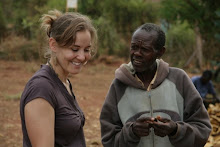
"Se wo were fi na wosankofa a yenkyi."
"It is not wrong to go back for that which you have forgotten"
I have never been the most patriotic of Americans. This has very little to do with what it means to be American, and more to do with how I see the world. I don't imagine I'd be any more gung-ho to be Canadian, British or Kenyan for that matter. To me, nationality is a crap shoot. Given the absence of my ink on the constitution, I don't feel a personal claim to what makes this country great/not great beyond my daily actions to support the good things therein. I cherish parts of our foundation and the subsequent (and continued) evolution of human rights that I hold dear - most notable among these, equality. But for me, the significance of country or citizenship is moot - we are born into a sliding scale of humanity, with some countries inevitably further along than others. I believe as individuals we are defined by our actions, not by our birth.
As a white, middle-class American growing up, I was often envious of friends whose culture or ethnicity offered prescribed values and practices that could be publicly acknowledged as such. Sometimes, such distinctions were painful, as when a friend told me at our 8th grade graduation she'd have to prioritize her Korean friends in high school out of respect for her family. Mostly, it was something that I felt a vague separation from - I just didn't have anything like ethnicity to identify with. What I did have was a close extended family with deep traditions tied to singing very specific family songs in treasured family spaces. As I grew, I came to identify these things as the unique culture I could claim as my own. Still, this was a small circle in comparison to the ethnic labels other communities could claim.
Over the years, such perspectives and experiences (coupled with a move from my child hood home and immersion into a variety of unfamiliar communities in high school and college), cultivated a deep sense of responsibility to be firmly independent. Not only did I want to avoid being a burden to anyone, I didn't want to need anyone: success meant being able to take care of myself. I vowed to never test whether I had the sort of safety net ethnicity and tribe can often provide in case, quite simply, it wasn't there (mind you this wasn't based on any lack of family support - my family is beyond generous).
When I talk about how my time in Africa has become a simple experience in humanity far more than a lesson in what's wrong with the countries that combine to make up this awe-inspiring continent, I mean it. Removing myself from my own communal framework and stepping away from this naive attempt to be "independent," helped me to see the value in identifying with a group. By stripping away years of politically correct conditioning and my personal feelings of exclusion, I started to understand (if not always totally agree with), how important it can be for someone to say with total confidence, "I am a [INSERT TRIBE/NATIONALITY/SELF-IDENTIFIER HERE]." While tribalism has many negative and potentially dangerous sides in any culture or context, I can now see how the gift of belonging can be critical to identity. Before, I felt any firm "I am" statement was laden with the potential to exclude or judge anyone else who might not be from the same "I am."
This Thanksgiving will be the fourth I have spent abroad, away from my tribe. In honor of this day, I'm resuming my "30 Days of Asante" posts and taking a moment to be thankful for learning that independence is often over-rated. I have been adopted by many cultures at this point, welcomed in and made to feel like I belong. I have also learned just how critical my sense of identity as an American...a Californian...a MacDonald or a Daniels, etc., is. While I'll never focus on the idea that one "I am" is any better than another "I am," I remain more and more thankful for my growing ability to identify in some way as a member of a larger group. Over the past year I have been overwhelmingly supported by my tribe of family and friends, all of whom have helped me let go of any presumption that I could exist, survive or thrive without the love, support and companionship of those who share my roots and history. Somehow, understanding this makes venturing out into the world in all its diversity, pain and splendor that much sweeter.
For this, I am thankful.

